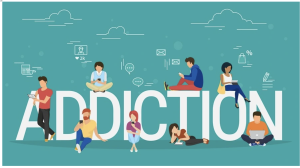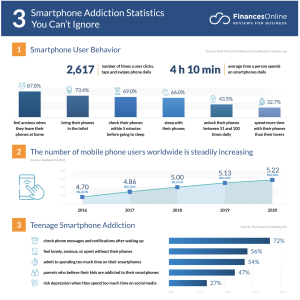A Bright Future
Rex Pan | October 8, 2022
In the past, the “bright” in bright future is a metaphorical term, meaning the limitless possibilities we have ahead of us; nowadays, the “bright” is ironically stating the brightness of the screens on our smart devices, which could be our phones, tablets, and any interface that connects us to the Internet. How many times have we bear witness to odd families dining scene at restaurants, when the family members are preoccupied with their smart devices, as opposed to having normal conversations with one another? How many times have we seen adults gave their phones to their kids, just so the children will be quiet and leave the adults in peace? On a more worrisome note, how many of us was aware that our interaction with the digital world was transformed into data, and such info was being collected covertly and used against us?
How are we being controlled by the online world?
We are so addicted to our phones and the Internet that we hardly pay attention to what is happening around us. We lost the ability to think independently. While we “voluntarily” hooked ourselves on the Internet, our regulations on internet privacy, personal data protection, and cyber security were very much lagged behind. Recently, we saw Facebook’s, now Meta, CEO Mark Zuckerberg testified in front of the Congress in regards to the newsfeeds during the 2016 presidential election. However, members of the Congress at the time did not do their due diligence as to understand how the algorithms and the mechanics of the Internet works. While the Internet evolves ever so rapidly, our legal frameworks struggle to keep up [1].

From the book Stolen Focus by Johann Hari, “false claims spread on social media far faster than the truth, because of the algorithms that spread outraging material faster and farther. A study by the Massachusetts Institute of Technology found that fake news travels six times faster on Twitter than real news, and during the 2016 U.S. presidential election, flat-out falsehoods on Facebook outperformed all the top stories at nineteen mainstream news sites put together. As a result, we are being pushed all the time to pay attention to nonsense—things that just aren’t so.” [2].

It is not news that big tech companies have algorithm that they use to “trap” you to stay on their platform. They have written codes that automatically decide what we will see [1]. Due to the algorithms, we see that algorithmic spread out hate speeches, disinformation, and conspiracy theories via major Internet platforms, and those had undermined America’s response to the COVID-19 pandemic. It has also increased political polarization and helped promote? white supremacy organizations. [3]
There are all sorts of algorithms they the big tech companies could use, ways they could decide what you should see, and the order in which you should see them. The algorithm they use varies all the time, but it all has one key driving principle – consistency. It shows you things that will keep you focused on your screen. That is the more time you stay on, the more money they generate. Therefore, the algorithm is designed to occupy your attention to the fullest whenever possible. It is designed to distract you from what matters most [2].
How behind are we in regulations for online privacy?
Public demands for policy maker for change began nearly a decade ago, when the Federal Trade Commission entered into a consent decree with Facebook, it was designed to prevent the Platform from sharing user data with third parties without prior consent [3]. However, nothing have improved since.
When we look at the history of regulatory and policy act, there are not many out there to regulate the use of data that are being collected from us, the users. As big tech giants, now armed with worldwide impact it is not helping the policy makers to create regulations in regards to the four major area – safety, privacy, competition, and honesty.
We are still relying on the US Privacy Act of 1974 to help guard and lay the foundation of laws covering data and internet privacy in the US. Later on comes the Federal Trade Commission (FTC) Act which provides guidelines on outlawing (or use “ruling out” instead?) unfair methods of competition and unfair acts or practices that affect commerce. We have Children’s Online Privacy Protection Act (COPPA) in 1998 to protect children. And the most recent, California Consumer Privacy Act (CCPA), which was signed into law in 2018, addressing consumer privacy by extending it to protections to the Internet. Similar to EU’s General Data Protection Regulation (GDPR), it give consumers the right to access their data, along with the right to delete and opt out of data processing at any time. However, CCPA differs from GDPR in the sense that GDPR grants consumers a right to correct or rectify incorrect personal data, whereas CCPA doesn’t. GDPR also requires explicit consent at the point when consumers hand over their data [1].
Moving forward
Although there are limited legal protections to internet interactions, bringing forward the awareness on ethical issues and privacy concerns is a good start. By understanding the privacy policy and the current regulation, it will help us act in movements towards better policies and regulations to protect our data. We may participate in the antitrust suit to help shape the future of the digital word. The more awareness and participation from the end users, the easier it will be for the policy makers to move forward with better regulations.
Citation
1. Kaspersky. (2022, May 11). What are some of the laws regarding internet and data security? www.kaspersky.com. Retrieved October 4, 2022, from https://www.kaspersky.com/resource-center/preemptive-safety/internet-laws
2. Hari, J. (2022, January 25). Stolen Focus: Why You Can’t Pay Attention–and How to Think Deeply Again. Crown.
3. McNamee, R. (2020, July 29). Big Tech Needs to Be Regulated. Here Are 4 Ways to Curb Disinformation and Protect Our Privacy. Time. Retrieved October 4, 2022, from https://time.com/5872868/big-tech-regulated-here-is-4-ways/
4. Wichowski, A. (2020, October 29). Perspective | the U.S. can’t regulate big tech companies when they act like nations. The Washington Post. Retrieved October 4, 2022, from https://www.washingtonpost.com/outlook/2020/10/29/antitrust-big-tech-net-states/
5. Chang, J. (2022, January 14). 90 smartphone addiction statistics you must see: 2022 usage and data analysis. Financesonline.com. Retrieved October 5, 2022, from https://financesonline.com/smartphone-addiction-statistics/
6. Paris, J. (n.d.). Struggling with Phone Addiction? Try This. Retrieved October 5, 2022, from https://thriveglobal.com/stories/struggling-with-phone-addiction-try-this/
